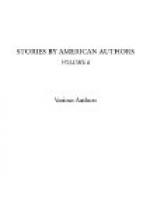He stopped a moment as if in doubt how to go on. Miss Eunice began to open her eyes, and she released the mantel. The man resumed with something like impressiveness:
“When you last held that,” said he, slowly, balancing the glove in his hand, “I was a wicked man with bad intentions through and through. When I first held it I became an honest man, with good intentions.”
A burning blush of shame covered Miss Eunice’s face and neck.
“An’ as I kep’ it my intentions went on improvin’ and improvin’, till I made up my mind to behave myself in future, forever. Do you understand?—forever. No backslidin’, no hitchin’, no slippin’-up. I take occasion to say, miss, that I was beset time and again; that the instant I set my foot outside them prison-gates, over there, my old chums got round me; but I shook my head. ‘No,’ says I, ’I won’t go back on the glove.’”
Miss Eunice hung her head. The two had exchanged places, she thought; she was the criminal and he the judge.
“An’ what is more,” continued he, with the same weight in his tone, “I not only kep’ sight of the glove, but I kep’ sight of the generous sperrit that gave it. I didn’t let that go. I never forgot what you meant. I knowed—I knowed,” repeated he, lifting his forefinger—“I knowed a time would come when there wouldn’t be any enthoosiasm, any ‘hurrah,’ and then perhaps you’d be sorry you was so kind to me; an’ the time did come.”
Miss Eunice buried her face in her hands and wept aloud.
“But did I quit the glove? No, mum. I held on to it. It was what I fought by. I wasn’t going to give it up, because it was asked for. All the police-officers in the city couldn’t have took it from me. I put it deep into my pocket, and I walked out. It was differcult, miss. But I come through. The glove did it. It helped me stand out against temptation when it was strong. If I looked at it, I remembered that once there was a pure heart that pitied me. It cheered me up. After a while I kinder got out of the mud. Then I got work. The glove again. Then a girl that knowed me before I took to bad ways married me, and no questions asked. Then I just took the glove into a dark corner and blessed it.”
Miss Eunice was belittled.
A noise was heard in the hallway. Miss Eunice’s father and the policeman were going away.
The awkwardness of the succeeding silence was relieved by the moving of the man and the woman They had done their errand, and were going.
Said Miss Eunice, with the faint idea of making a practical apology to her visitor, “I shall go to the prison once a week after this, I think.”
“Then may God bless ye, miss,” said the man. He came back with tears in his eyes and took her proffered hand for an instant. Then he and his wife’s sister went away.
Miss Eunice’s remaining spark of charity at once crackled and burst into a flame. There is sure to be a little something that is bad in everybody’s philanthropy when it is first put to use; it requires to be filed down like a faulty casting before it will run without danger to anybody. Samaritanism that goes off with half a charge is sure to do great mischief somewhere; but Miss Eunice’s, now properly corrected, henceforth shot off at the proper end, and inevitably hit the mark. She purchased a new Crofutt.




